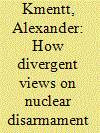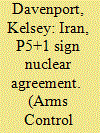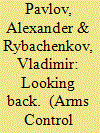|
|
|
Sort Order |
|
|
|
Items / Page
|
|
|
|
|
|
|
| Srl | Item |
| 1 |
ID:
127854


|
|
|
|
|
| Publication |
2013.
|
| Summary/Abstract |
The nuclear Nonproliferation Treaty (NPT) is facing several serious challenges. There are increasing doubts about its effectiveness in preventing the proliferation of nuclear weapons. The actions of North Korea are deeply worrying and significantly undermine the NPT edifice. The complex issue of the Iranian nuclear program and if and how it can be resolved will have serious repercussions for the treaty.
Universality is a key ingredient of the NPT's credibility, but looks more and more distant. Without India, Israel, and Pakistan, which never were parties, and North Korea, which declared its withdrawal from the treaty in 2003, the NPT's value as a security and confidence-building instrument is increasingly put into question in the regional contexts of the Middle East and Asia. Arguably its most serious challenge, however, is the extent to which it can still be considered as a framework in which to achieve nuclear disarmament. Fundamentally different and even conflicting views are apparent among the NPT membership on key aspects, such as the priority of nuclear disarmament, the demands of Article VI,[1] the definition of credible progress, and the way forward. These differences threaten the integrity of the NPT.
|
|
|
|
|
|
|
|
|
|
|
|
|
|
|
|
| 2 |
ID:
127859


|
|
|
|
|
| Publication |
2013.
|
| Summary/Abstract |
Iran and six world powers last month achieved an apparent breakthrough in negotiations over Tehran's controversial nuclear program when the parties reached a first-phase agreement on a six-month deal that will halt Iran's most sensitive nuclear activities and increase international monitoring of its nuclear program in exchange for some relief from sanctions that have hurt Iran's economy.
|
|
|
|
|
|
|
|
|
|
|
|
|
|
|
|
| 3 |
ID:
127857


|
|
|
|
|
| Publication |
2013.
|
| Summary/Abstract |
In February 1993, Russia and the United States signed an agreement on the disposition of highly enriched uranium (HEU) extracted from Russian nuclear weapons.[1] Under the terms of the deal, Russia undertook to down-blend 500 tons[2] of HEU, enough to build 20,000 nuclear warheads, over a 20-year period. The two sides agreed that the resulting low-enriched uranium (LEU) would be used as fuel by nuclear power plants in the United States, hence the informal name of the program, "Megatons to Megawatts."
In January 1994, Russia's Techsnab-export (Tenex) and the United States Enrichment Corporation (USEC), the state-run companies authorized by their respective governments to implement the deal, signed the contract. In the U.S. case, that meant that USEC was a supplier of enriched uranium to private utilities. According to assessments made at the time, the value of the entire program was expected to reach about $12 billion.
|
|
|
|
|
|
|
|
|
|
|
|
|
|
|
|
| 4 |
ID:
127856


|
|
|
|
|
| Publication |
2013.
|
| Summary/Abstract |
As the Dutch "sherpa" for the nuclear security summit scheduled to take place March 24-25 in The Hague, Piet de Klerk is the host country's lead coordinator and negotiator for the event. Before taking that position in mid-2012, he was the chairman of the Nuclear Suppliers Group. From 2011 to 2013, he was the Dutch ambassador to Jordan. In previous postings with the Dutch Foreign Ministry and the International Atomic Energy Agency (IAEA), he has held numerous positions dealing with nuclear arms control and nonproliferation.
|
|
|
|
|
|
|
|
|
|
|
|
|
|
|
|
|
|
|
|
|